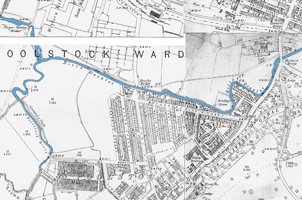
On’t banks u’t River ‘Duggus,’ tha knows wi grew up theer,
In’t village O’ Poolstock, noan far fro Wigan Pier.
Wi didn’t know wheer it came frum, un wi didn’ know wheer it went,
But we childer played beside it, an it flowed to eawr content.
It made Poolstock an island, wit canal alung wun side,
Un’t brook frum wun to’t tother, passin t’mill which is supplied.
Ut beginnin uv eawr village, canal un’t river awmoost met,
Then vergin frum each uther, went as far us each cud get.
Poolstock steawted ut Henhurst bridge, wher t’river ran amok,
Un soon bacame a watterfawl, us it thundered ower t’rock.
Frum t’watterfawl, straight fer o bit, then twisted reawnd abeawt,
Past back o’t thouse built on’t bank, it rippled in an eawt.
T’ houses were built fert workers, ut mill in owd Nat’s pit,
They huddled wun another, un were moost inadiqwit.
Sum workers cud’nt affoord much rent, no moor thun haaf u creawn,
They felt themselves reet lucky, wi two rooms up, two deawn.
Un sum ad only wun below, un wun abuv fer’t bed,
Ther weren’t much room fert move abeawt, tho it wos o roof ower t’hed.
But them i’ Corporation Street, ad o parler un o lobby,
Ther backyards stretched tut river bank, un thy grew fleawers fer o hobby.
To live theer cost moor money, they hed av o job o skill,
O fireman ut pit maybe, or o owerlooker ut mill.
Un summ lived theer us ad o trade, a cobblr an a baker,
Un wun ther wuz made coffins, he wuz un undertaker.
Ut t’hend o Corporation Street, wuz t’Hunnysuchle Inn,
Wheer menfolke went on Friday neet, then took their wives a gin.
It stood on’t banks ut ‘Duggus,’ by’t road to Wigan Town,
Un so enhanced witt river, wuz a pub o sum renown.
Next by’t meadows t’river went, t’houses theer wur few,
A pretty stretch un good fer play, it flowed to pastures new.
We childer luved this peawrt ut’ stream, fawin in un clamberin eawt,
Wi wuddn’t av ad haaf ut fun, if t’river we’d bin beawn.
It weren’t a famous beauty spot, but t’banks were lush un green,
Un when t’sun shone on’t watter, it gave a luvly sheen.
Un if tha’d chance to go up t’tower, i’nt village church th’d find,
Us good a view us ony other river o’ it’s kind.
Now, me eldest sister Sally, wuz courtin but she sed,
Her intended ad to find a heuse, before she’d promise t’wed.
Wun neet he came wi happy news, he’d found a heause us ud do,
It wuz wun o them wun roomed uns, but big enough fer two.
She went to av a look at it, suspicious of his pranks,
It wasn’t Sally’s cup o tay, she loudly sed ‘No Thanks.’
It wuz built on’t bend o’t river, precarious like ower’t stream,
‘Heavens, It’ll faw in ony minute,’ her voice rose to a scream.
‘On a windy neet i’ bed up theer, wi’d topple in, Lord luv us,’
Nay, tha, Never gerrin Sally o’ Sallyin t’deawn ‘Duggus.’
Neaw, it’s mony a year sin mi childhood,
Wot av written is memories song,
Un’t t’heauses alas uv aw bin poowed deawn,
But eawr River ‘Duggus’ is still flowing along.

Written in July 1984, in Lancs dialect. Translated version here.
 This Ordinance Survey Map of Poolstock dating from 1894 (click to enlarge) shows the River Douglas much as Doris describes it in her verse. The river flows from right to left on this map, beginning at Henhurst Bridge (on Poolstock Lane) in the upper right. It flows past the Bowling Green and along the north side of Corporation Street. It passes under the Douglas Bridge at Pool Street and onward through the meadows where it bends to the southeast. There Poolstock Brook branches off to the southwest past Poolstock Mill (probably a cotton spinning or weaving mill) “which it supplied.” The map doesn’t show the brook connecting with the Leeds & Liverpool Canal but we can take Doris's word for it!
This Ordinance Survey Map of Poolstock dating from 1894 (click to enlarge) shows the River Douglas much as Doris describes it in her verse. The river flows from right to left on this map, beginning at Henhurst Bridge (on Poolstock Lane) in the upper right. It flows past the Bowling Green and along the north side of Corporation Street. It passes under the Douglas Bridge at Pool Street and onward through the meadows where it bends to the southeast. There Poolstock Brook branches off to the southwest past Poolstock Mill (probably a cotton spinning or weaving mill) “which it supplied.” The map doesn’t show the brook connecting with the Leeds & Liverpool Canal but we can take Doris's word for it!
Many of the landmarks Doris mentions in her verse can be seen on this old map, or are located nearby:
For those interested, Wikipedia has a page on the River Douglas.
Copyright Doris Darbyshire